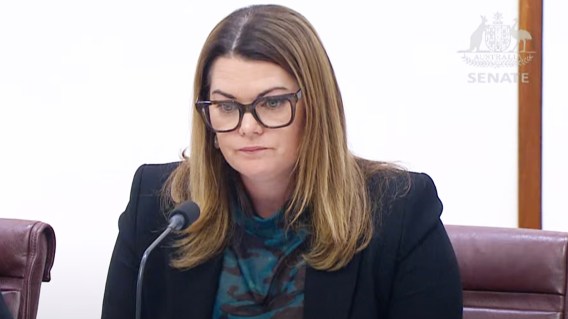Google reignites campaign against under-16s social media ban

Sarah Hansen-Young wants to subpoena Tiktok, Meta and Snapchat to appear before the Senate
Google has mounted a final push against Australia’s proposed social media ban for under-16s, just six weeks ahead of its implementation on 10 December.
Appearing remotely at Senate Estimates in Canberra today, Youtube’s Rachel Lord reiterated the tech giant’s stance that the legislation will be “extremely difficult to enforce” and “does not fulfil its promise of making kids safer online”. Youtube is owned by Google, and until July was hopeful of being exempted from the under-16s ban.
While Google, Youtube and Microsoft appeared, Meta, Snapchat and Tiktok ignored a request from the committee to appear: a refusal which had Greens Senator Sarah Hansen-Young calling for them to be forced to give testimony.
“I just want to put on the record that we did request that Meta, Snapchat and Tiktok appear today,” she said.
“They so far have refused and the senate committee will be discussing what we do. I for one think we should be using the powers of the Senate to subpoena their appearance.”
Under questioning from senators, Youtube’s Lord argued that requiring users under 16 to remain in a “logged-out” state would effectively strip them of Youtube’s parental controls and safety features, which are only accessible when logged into an account.
Enjoying Mumbrella? Sign up for our free daily newsletter.
These tools include contextual ad targeting instead of personalised ads; blocked ads for alcohol, drugs, body image and gambling; auto-play restrictions, and features like “take a break” prompts.
“Youtube has invested heavily in designing age-appropriate products and industry-leading content controls,” Lord added. “Forcing kids to use Youtube without an account removes the very parental controls and safety filters built to protect them across sport, music, creative learning and classrooms.”
She also warned that an unintended consequence of the legislation could be more children accessing content through parents’ or adults’ accounts, which she described as “a really poor safety outcome.”
Google and Microsoft’s appearance before the Senate Environment and Communications References Committee coincides with a series of private meetings between Communications Minister Anika Wells and major platforms, including the missing Meta, Tiktok, and Snapchat.
Wells is expected to reiterate government expectations for the implementation of the law, but warning the platforms that “there is no excuse not to be ready”, according to an announcement from her office.
Note: Lord’s official title is “senior manager of government affairs and public policy in Australia and NZ”.


The industry was given flexibility and a level of self-regulation very few others enjoyed in the name of supporting innovation. Instead of finding a way to do the right thing they always chose the wrong. Who knew companies lead in other countries, who don’t pay tax and have no reason to consider their impact on societies would put hate, preditor, antisocial and zero-sum strategies ahead of child protection.
Ahh yes, the it’s all about ‘protecting the children’ argument.
Most of us, critical thinking, individuals know that this is so much more than just ‘protecting the children’ from hurty words and images online.
Rachel Lord cannot possibly believe her own self-serving testimony. And her “unintended consequences of the legislation” are laughable at best.
Social media is addictive by design, and every year millions of $$ are poured into research making it so. It has proven negative effects, particularly among teenagers, like increased anxiety, depression, and poor body image. And these impacts are linear… not just linked to overuse. They start from minute 1. The government owes it to society to put guardrails in place that help parents parent, and not just give unfettered access to our children and blindly hope all will be OK.
Did you bother to read what Rachel Lord actually said before writing that?
YouTube has lots of very carefully thought-out guardrails for younger people. (I’m a parent to one of them). How will it help – at all – for those younger people to have no guardrails at all, and just use it “logged out”?
(And, more to the point, how is YouTube “social media”?)
A bad policy from a government that doesn’t understand either technology or parents.
Who cares if it is difficult Google! Dont expect tears from us! You make 10s of billions here and pay almost zero tax, completely disassociating yourself google from any moral or ethical obligation to Australia. You do some notional green projects, big deal ..by offshoring your tax obligations you are making us paying more, small business pay more, what you should be ethically paying for your share of schools roads hospitals aged care ndis utility infrastructure….. pay up pay your fair share stop leaching off us and if you don’t like our rules like clerwly you dont like contributing to our society (tax) …go, see if we care.
Who cares if it is difficult Google! Dont expect tears from us! You make 10s of billions here and pay almost zero tax, completely disassociating yourself google from any moral or ethical obligation to Australia. You do some notional green projects, big deal ..by offshoring your tax obligations you are making us paying more, small business pay more, what you should be ethically paying for your share of schools roads hospitals aged care ndis utility infrastructure….. pay up pay your fair share stop leaching off us and if you don’t like our rules like clerwly you dont like contributing to our society (tax) …go, see if we care.